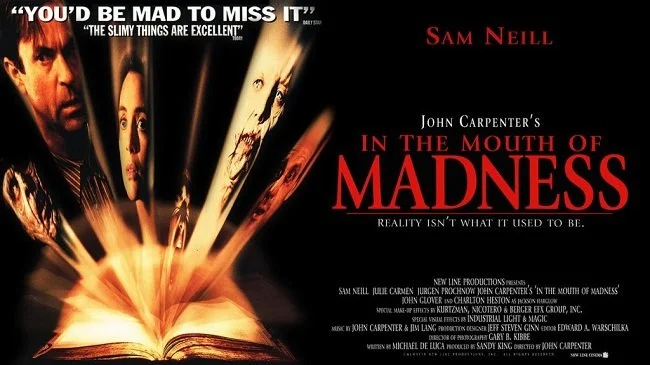Malignant (2021)
Madison Lake (Annabelle Wallis) returns home to her husband, Derek Mitchell (Jack Abel), after her pregnancy causes her to be ill at work. During an argument, Derek hits Madison's head against a wall. Madison locks herself in the bedroom to avoid him and falls asleep. She later wakes up to find Derek dead, after having a dream of someone entering their house and violently killing him. The killer, who is still in the house, attacks Madison. The next morning, Madison wakes up in a hospital and is greeted by her sister, Sydney (Maddie Hasson). She is told that her baby didn't survive the attack. After being interviewed by police detective Kekoa Shaw (George Young) and his partner Regina Moss (Michole Briana White), regarding Derek’s death, Madison returns home. As there was no sign of forced entry into the house and Derek was known to be an abusive spouse, the police suspect that Madison is the murderer. Madison continues to experience vivid waking dreams in which a mysterious figure commits murder.
Once again, while reviewing a contemporary horror film, I am forced to repeat myself which probably doesn’t make for especially engaging reading. Never mind, ultimately this is not my fault. So, for the record, here we go again. The trouble with being an avid fan of something is that it ultimately brings a great deal of familiarity with that which you enjoy. Over the years I have seen a great many horror films. Classic, cult movies and obscure niche market titles. I read extensively, liking to know about specific film productions, the technicalities of film making and what titles are venerated and why. All of which brings me a great deal of pleasure. However, it also means that because of my analytical approach to viewing horror films, along with a substantial amount of personal knowledge, I tend not to be surprised, perturbed or wrong footed by many of the films that I see. This can sometimes diminish my enjoyment somewhat.
With this comprehensive caveat out of the way, James Wan’s Malignant may well scare the occasional or casual viewer of horror films. They may also find the main plot device to be unusual. Sadly, if you’ve seen Basket Case (1982), The Dark Half (1993) or recollect the scene from Total Recall (1990) involving Kuato, then much of what Malignant has to offer will seem less impressive. Furthermore, for a film to succeed and to engage its viewers, it requires them to suspend their sense of disbelief. Horror fans by default can be more accommodating than other genre enthusiasts regarding this, because horror so often deals in supernatural concepts and extreme themes. However, if the horror genre abuses this goodwill they’re granted by their audience, they end up losing them. I believe this is the case with Malignant.
There are some good aspects to Malignant. The lighting is very atmospheric, and the action scenes are dynamic. The camera is seldom still and is not content to confine itself to traditional linear movements. Some of the violence is quite unpleasant, especially if you have an aversion to open fractures. But there are two specific failings that director James Wan makes. The first is clumsy plot exposition and some frankly quite hokey dialogue. Certain characters seem to have no purpose beyond delivering a slab of story content and advancing the plot. The second is regarding the film’s own internal logic. It is set ostensibly in the real world. Yet what happens is often so left field or over the top, that it stretches even the most accommodating viewer’s suspension of disbelief. The story’s implied “happy ending” simply doesn’t ring true as there would be far too many questions and consequences, arising from the events of the film itself. As a result, Malignant is an interesting misfire.




























